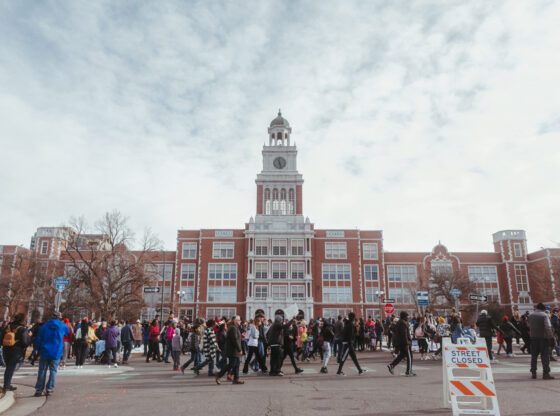In the 1970s, the University of Denver was overflowing with student activists protesting the Vietnam War in an event called “Woodstock West.”
Sheila Schroeder, a DU professor and current-day activist, is in the process of creating a film called “Woodstock West: Build Not Burn,” that provides the history of Woodstock West on DU’s campus, first-hand accounts of individual experiences and highlights student activism and how the lives of these 1970s students have changed since their involvement in the protest.
Schroeder has been teaching classes at DU for many years in the field of film production, and about 11 years ago she was inspired by two of her students to delve further into investigation about the effects of Woodstock West on DU’s campus.
“I had two students who were doing a story for a class where we were creating a video news magazine,” said Schroeder. “All the students pitched five-minute pieces about topics relating to DU and they pitched the Woodstock West event through archives they found.”
After this idea was presented to her, Schroeder received funding to gather research on Woodstock West to see if any visual evidence of the event existed.
Once evidence was found at the Colorado Historic Society in the form of student protest videos, Schroeder and her student research assistant, Mariel Rodriguez McGill, digitized the footage for their computers to compile all of the research and information gathered from primary sources and create an interactive documentary film, as well as have an online presence.
“My main goal is to finish a film,” said Schroeder. “I want to explore a new way of story-telling using interactive documentaries, which is an online platform that is user directed, so the viewer can decide where they want to go in the film.”
As the film is still in the production process, the film-making team has begun communicating with DU alumni that have first-hand experiences as activists on the DU Woodstock West campus.
“It’s a snowball sample,” said Schroeder. “We talk to one person and hear their story, and then we get more names passed down to us.”
Right now they have four personal accounts of former students’ experiences in Denver during the 1970s that vary in occurrence and outcome, but show a more personal, rather than historical side of the protests. However, it has been challenging for Schroeder to receive specific feedback from first-hand accounts when all the facts she is receiving are solely from memory.
“I’m asking about an event that occurred 40 years ago, so it’s hard to get a collective memory restored,” said Schroder. “We had people swear they saw tanks come on campus, but I have not seen any visual evidence of tanks.”
In the 1970s, Woodstock West was a protest for peace and it created widespread interest in the DU student body. In our current generation, student activism is still in existence, students have lost interest.
“The title of our film is called ‘Build Not Burn,’ because we want viewers to create a positive connotation, with activists as ‘Builders,'” said Shroeder.
This academic school year, Schroeder has been working closely with Nadia Kaneva, another professor in the Media, Film and Journalism Studies department, to incorporate the planning and research of the contest into a public relations course curriculum. Students have broken into teams to create a marketing plan on how to effectively promote “Woodstock West: Build Not Burn.”
“I thought it was really good experience applying the skills I had learned in my Strategic Communications class to a real life project,” said sophomore Sophia Hoad, a strategic communications major. “My team thought it would be the most effective marketing tactic, by intertwining the video contest as part of a course requirement, so students will gain college credit whether they win the contest or not.”
Schroeder is dedicating the majority of her time and effort to producing this film and expects its completion this fall.
More information on “Woodstock West: Build Not Burn” can be found at: http://woodstockwestthemovie.com.










